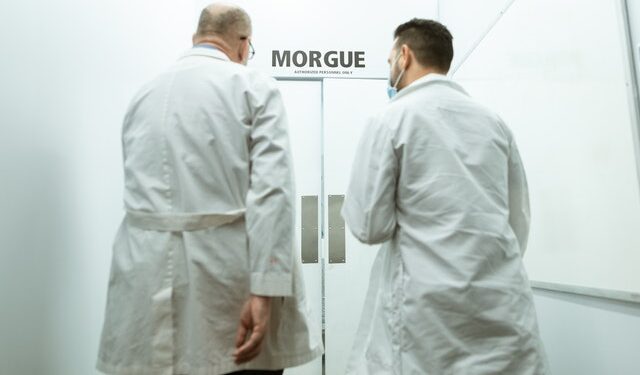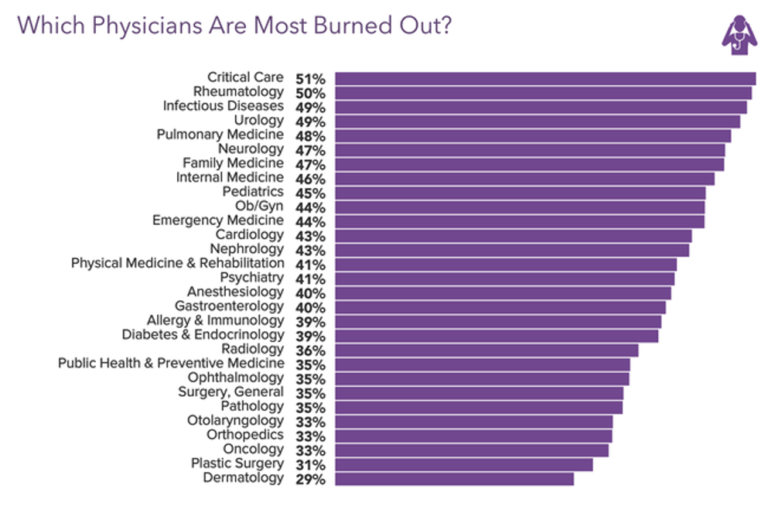
Let’s talk about physician wellbeing in the COVID era. Burnout and depression are serious and growing problems among physicians, especially amid COVID-19. The 2021 Medscape National Physician Burnout and Suicide Report makes for disturbing reading.
Against this backdrop is a chronically stressed, underfunded and corporatized medical system. In the US alone, about 300 physicians a year are lost to suicide. A global pandemic was unlikely to help things.
More than 12,000 doctors across 29 specialties responded to the anonymous survey which ran from August to December 2020. Briefly, the key findings were:
42% of US physicians are burned out...Woman physicians have higher burnout rates than men, and the gap is widening
Not unexpectedly, in the 2021 Medscape physician burnout report and given the pandemic, Critical Care, Infectious Diseases, and Pulmonology Specialists are in the top 5 affected. Less easy to explain is such high rates in Rheumatologists and Urologists.

The survey found that the biggest contributors to burnout were:
Colleagues reported that the most challenging parts of their jobs were the long working hours, so many rules and regulations, electronic health record (EHR) systems, and reimbursement issues.
In this physician burnout report, 70% of burned-out colleagues reported that burnout had a “moderate to severe impact” on their lives.
The level of US physician happiness has decreased significantly from 69% pre-pandemic to 49% at the time of the survey. Work-life balance remains our primary concern (45%) followed by inadequate compensation (20%.)
Although 26% of physicians stated that their burnout began during the pandemic, the majority did not. Stress from treating COVID-19 patients had only a minor contribution (8%) to physician burnout.
Even before the pandemic, 19% of physicians said they were somewhat or very unhappy in their work-life; after COVID-19, this rose to 34%.
Even before the pandemic, 19% of physicians were unhappy in their work-life; after COVID-19, this rose to 34%
More than two‐thirds (69%) of physicians said they felt “down” (which the researchers termed “colloquial depression)”.
As in previous years, of the 20% of physicians who said they were depressed had clinical depression.
Of those doctors reporting clinical depression, 13% said they experienced suicidal thoughts, and 1% had attempted suicide.
Read more on: Medicine is making us (physicians) sick.
More than one‐third of all physicians who report depression say it leads them to be more easily annoyed with patients. A quarter say that they are less diligent when taking patient notes, and 15% said depression results in them making errors they would otherwise not make.
One respondent to the Medscape physician burnout report, when asked about the cause of their burnout, replied soberingly: “It’s all of these causes; it’s death by 1,000 cuts.”
While over half of respondents felt that their symptoms were not severe enough to seek help, 4 out of 10 of them said they were either “too busy” or “could cope without professional help”.
Most concerningly, some 20% of us feared the risks of disclosure. Six percent felt that they did not trust mental health professionals, which is a challenge for mental health services but also reflects the enduring stigma against mental health in general. Colleagues should know that they will get professional care, that confidentiality will be sacrosanct, and that they will be treated not as colleagues with all the answers but as patients with special needs. Sadly, several state licensing boards mandate disclosure of receiving mental health support – a sure-fire barrier to the struggling physician.
And it’s further complicated in that only one-third of doctors reported their workplace offered a program to reduce stress or burnout.
...Their symptoms were not severe enough to seek help, 4 out of 10 of them said they were either “too busy” or “could cope without professional help”. Most concerningly, some 20% of us feared the risks of disclosure.
On an individual level, the survey revealed that 48% of us use exercise to cope with burnout, and 43% talk to family or close friends. These tactics far overtake the most negative coping mechanisms, like “drink alcohol” (26%), “binge-eat” (21%), and “use prescription drugs” (3%).
With close to half of physicians who are facing burnout willing to speak with people they trust, there is an opportunity to offer support. This willingness suggests that a fellow doctor in a safe space will be a good confidante.
To overcome these barriers to getting help, physicians need easy access to safe spaces – that are safe for the doctors, their careers, and their patients.
Read more on: Why Struggling Physicians Don’t Seek Help
More than 4 in 10 of US physicians are burned out. One in 5 are clinically depressed. COVID has generally increased burnout and stress.
Our service, Physicians Anonymous was set up to provide a completely anonymous and confidential peer support group for any doctor at any time. We use secure software to keep you safe. We are staffed by volunteers and paid professionals with a passion for physician wellbeing. Our motto is “Doctors supporting doctors”.
